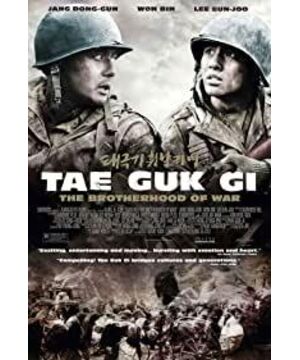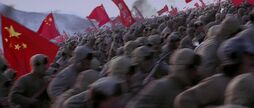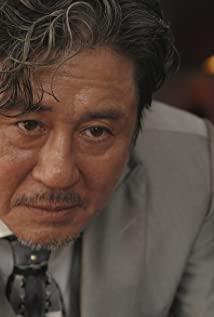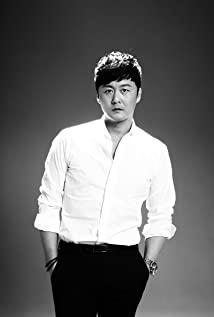When I learned from the Internet that South Korea made a war film called "Flying Taiji Flag", the box office number exceeded 10 million, and I was quite dissatisfied. Korean commercial films have grown rapidly in recent years, but they are mainly comedy or romance films. In this regard, Hong Kong and Taiwan are also very good at this, but looking at the so-called war scenes in Hong Kong and Taiwan film and television, I am really a little nervous: a few people walk through the motions and it is like a war between the two armies. How many old horses are left.
So I didn't have much expectation when watching "The Tai Chi Flag Flying". But after reading it, I had to revise my opinion. Comparatively speaking, this is a very good war movie. Of course, this "comparison" is not with Hollywood, but with other Asian films, including Chinese. Because the commercial operation of Hollywood movies has reached its peak, it is difficult for anyone to surpass it in the short term. Compared with South Korea, films in Asia, especially mainland China, have not been commercialized for a long time, and they are neighbors in the same cultural circle, so there should be many comparability.
Compared with Hollywood's big production and near-perfect details and sensationalism, "Flag of Tai Chi" is undoubtedly a bit rough. But compared with Chinese war films, "The Tai Chi Flag Flying" has surpassed too much.
In Chinese war movies, we can see the leaders strategize and win thousands of miles, and we can see the soldiers marching forward bravely, as if they never doubted the meaning and value of war, and never felt the horror of life being destroyed. Due to the lack of in-depth discussion of the physical destruction and mental trauma caused by war, or the lack of attention to the fate of ordinary people and human nature in the war, Chinese war films often become the praise of leaders and the reproduction of war scenes, more like It's a documentary.
Franklin said there was never a good war, or a bad peace. Wars are often manipulated by some politicians or political groups. For ordinary people, the sacred excuses used by politicians or political groups to launch wars have no meaning. In "Flag of Taiji Flag", a soldier asked: "Is ideology so important? Kill each other for this?" Innocent children", who may "don't know what communism and democracy are", don't know the reason for the war, and have already lost their lives on the battlefield.
In "The Taiji Flag Flying", although the life of Jinxi's family is not very good, it is stable and full of hope for the future life. But an intra-ethnic war dragged them into a whirlpool. In the face of war, individuals become dolls at will, Jintae changed from a fighting hero in the south to a soldier in the north, his fiancee Yingshun became a communist from an ordinary woman, and Yongxi was originally a southerner. He became a soldier of the North, and was eventually killed by a soldier of the South as a prisoner of war. Everyone's identity is full of uncertainty, and the constant transformation of these ordinary people's identities highlights the chaos brought about by war and the absurdity of war itself.
War is the collective madness of mankind. In the course of war, all normal order is turned upside down. It will inevitably cause the destruction of innocent people's homes and lives. In Chinese war films, the suffering of war is caused by the enemy, and we always appear as liberators. The terrible thing about war is that it is a meat grinder. Without reason and logic, it will not become milder because of the subjective goodwill of the warfighters. War has turned man into cannibal beast. In "The Taiji Flag Flying", Zhentai's final image is no longer any different from a beast. And the fight between Zhenxi and the North Korean soldiers illustrates a truth: on the battlefield, if you don't kill others, others will kill you.
In his later years, Zhenxi returned to the battlefield to pay homage to his deceased brother, and the vicissitudes of life made the war even more meaningless. War, as Hemingway said: "There is no glory, the so-called sacrifice, it is like the slaughterhouse in Chicago, but the meat slaughtered here is not canned, but buried."
War is a game of killing. The justice of war cannot cover up the cruelty and irrationality of war. I don't think it will erase the unease and fear of soldiers caused by killing. In Chinese war movies, our soldiers seem to no longer have any fear and anxiety once they feel that they are engaged in a just cause. The film also pays little attention to their inner worlds or turns their psychological activities into political slogans. In the famous war novel "All Quiet on the Western Front", Paul faced the Frenchman who was stabbed to death by himself and said: "You are as poor as we are, your mother is as frightened as our mother, and we are all equally afraid of death. , will die in the same way, and suffer the same pain." Facing the hordes of Russian captives, he thought: "An order makes these silent figures our enemies; an order may make them our friends. ." After seeing a person's death, I couldn't help saying to myself: "I saw him die with my own eyes, and I didn't know what death was all about before that." In "The Tai Chi Flag Flying", Zhen Zhen The reflection shown by Tin is similar to that of Paul, which shows that the director has a deeper understanding of war.
The details of "Flying Taiji Flag" are also relatively delicate, especially the shaping of some soldiers has their own characteristics. That kid named Chengzhe, who volunteered to join the army, was the first to collapse in front of the war and ended everything by suicide. Sergeant Lin, who had a broken arm, insisted on dissuading Zhenshi not to return to the battlefield, and he never said anything of hatred for all red. War is essentially the destruction of human nature. This is the real war. And what we see from the domestic war films are revolutionary romantic passion without any deep thinking about war. Every soldier is full of revolutionary pride, and seems to have no fear. They want to carry the revolution to the end. They become a group under the slogan, and they become the absent individuals present. So our war movies sometimes look pretty lively, but it always feels like something is missing.
From "Flag of Tai Chi", we can see that South Koreans still have reflections on the Korean War. Although the film contains a lot of content against North Korea, it also reflects the brutality of the Korean purge. In a country with strong nationalism and patriotism, being able to write about war in this way is already invaluable.
View more about Tae Guk Gi: The Brotherhood of War reviews









